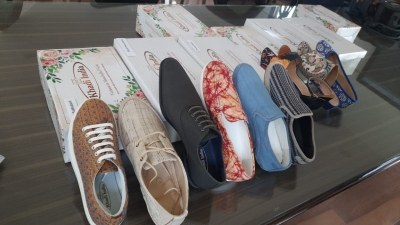
New Delhi, July 28 (IANS) India’s leather and footwear exports to the UK are expected to nearly double from $494 million in 2024 to $1 billion within three years following the signing of the bilateral free trade agreement, Commerce and Industry Minister Piyush Goyal said on Monday.
The agreement also simplifies customs procedures, aligns technical standards, and ensures protection of Indian Geographical Indications (GI) such as Kolhapuri footwear and Mojari, allowing Indian products to gain enhanced visibility in the UK’s $8.7 billion leather and footwear market, the minister observed at a meeting with exporters here.
Key manufacturing hubs across the country are set to benefit significantly, with a projected surge in demand expected to generate thousands of new jobs, particularly among MSMEs, artisans, women entrepreneurs, and youth-led enterprises, he added.
The India-UK Comprehensive Economic and Trade Agreement (CETA) eliminates the UK’s import duties for Indian products, which till now have ranged from 2 per cent to 8 per cent for leather goods, 4.5 per cent for leather footwear, and 11.9 per cent for non-leather footwear. This levels the playing field for Indian exporters against competitors such as Bangladesh, Cambodia, and Vietnam, who have enjoyed preferential access to the UK market.
By facilitating duty-free access and regulatory ease, the India-UK CETA enhances pricing power and global visibility for Indian manufacturers, especially in high-quality leather and fashion products that are in strong demand in the UK.
Government initiatives like the Indian Footwear and Leather Development Programme (IFLDP), with an outlay of Rs 1,700 crore, and the proposed Focus Product Scheme for the footwear and leather sector support capacity expansion, technology upgrades, creation of mega clusters and design studios, and international brand promotion, the minister pointed out.
The Department of Commerce held an industry interaction with stakeholders from the textiles, leather and footwear sector to discuss the opportunities created by India-UK Comprehensive Economic and Trade Agreement (CETA).
Goyal said that the agreement is a transformative opportunity for India’s textiles, leather, and footwear industries. He noted that the CETA has also positioned India’s textile sector for a significant surge in exports.
The agreement provides Indian textile & clothing products with duty-free access to the UK market and addresses the duty disadvantages (of up to 12 per cent) that the Indian textiles sector faced in the UK vis-a-vis some key competing countries like Bangladesh, Cambodia, and Pakistan. The zero-duty market access will benefit segments such as ready-made garments, home textiles, carpets, and handicrafts and set the tone for a sharp surge in exports.
The agreement will help in increasing the demand for Indian textiles and benefit all major textile clusters such as Tirupur, Jaipur, Surat, Ludhiana, Panipat, Bhadohi, and Moradabad. The CETA is expected to have a positive impact across the textiles value chain, benefiting various stakeholders and boosting employment generation in this labour-intensive sector.
The representatives of various Export Promotion Councils and Industry associations welcomed the India–UK CETA and mentioned that the duty-free access will make Indian products more competitive and provide a level playing field to Indian textile exporters. During the interactions, the need for follow-up steps to be taken by the textiles industry to effectively utilise the benefits provided by the FTA was also emphasised.
–IANS
sps/vd



